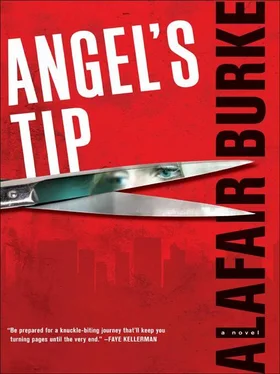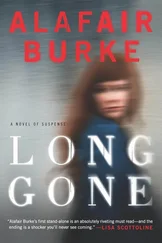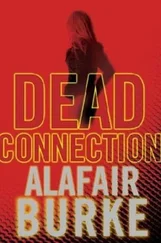She had assumed that Capra had been the source for the story about Chelsea Hart’s hair, but in fact there had been no leak at all. Kittrie had even covered his tracks by getting the information slightly wrong-asking her whether Chelsea’s head was shaved. And there had been no contact with Flann McIlroy three years earlier. She had assumed that Peter was lying when he said Kittrie had a quick trigger on running the presses, but it had been Kittrie who lied about his contacts with Flann.
George Kittrie knew that a killer was collecting his victims’ hair because he had committed the murders.
When she had met Kittrie with Peter at Plug Uglies, he had looked familiar. Kittrie played it smart, convincing her she could have seen him at the bar during one of his investigative happy hours. But now she knew where she’d spotted him before. He had been caught in the background of the photograph Jordan McLaughlin had given her of the three girls at the Little Italy restaurant.
They had an APB out on Kittrie’s 2004 Ford Taurus and an emergency service unit on its way to his East Hampton cottage. In the meantime, there was nothing to do but begin a search of the apartment.
She snapped on a pair of latex gloves and started with the desk. She found what she was looking for in the file drawer, inside a folder labeled “Medical Records.” She couldn’t make out the terminology on the stack of papers from Sloan Kettering, but she didn’t need an M.D. to understand that repeated references to glioblastoma multi-forme in the cerebral hemisphere were not good.
Those rumors Peter had heard about his boss’s condition were true: George Kittrie had an inoperable brain tumor.
“When we found out about Symanski’s mesothelioma, we were talking about the desperate things people do when they know they’re dying. Symanski wanted to go out a hero. Kittrie wants to take others with him. Or maybe he wants to get caught. If this thing goes to trial, we might even hear some expert argue that it was the brain tumor causing his violent tendencies all along.”
“And why is he so focused on you?” Donovan asked.
“I’ve gotten a lot of media attention, and that’s probably important to him. It could have been those things I said in the Dateline interview about William Summer being a loser. A man like Kittrie could empathize with someone like Summer. Both share the same desires. Both men stopped acting on those desires for long periods of time, which is probably seen by them as a sign of power and control. Summer was just given a life sentence, and now Kittrie finds himself at the end of his life. I can see how his desire to kill again could get transferred onto me.”
She scanned the wide array of titles shelved above Kittrie’s desk. Mostly nonfiction: civil war histories, biographies of the robber barons, a few contemporary memoirs. She spotted three consecutive copies of the same book, 9/11: Scoundrels and Profiteers, by George Kittrie, and pulled one from the shelf. Kittrie smiled at her from a black-and-white photograph on the inside cover. She checked the copyright date. Five years ago.
When she replaced the volume on the shelf, a thick black-leather-bound book caught her eye among the colorful dust jackets. She opened it to find a collection of feature articles authored by George Kittrie, arranged in chronological order. She noticed that the prominence of the stories increased after the publication of his book.
“It could have been the book deal that made him stop after Alice Butler,” she said. “William Summer stopped because he got a promotion at his job. Maybe being a published author gave Kittrie the satisfaction he needed to gain control over his urges. Until I set him off, of course.”
“Hey,” Donovan said. “This is not your fault. He knows he’s dying. He would have killed those girls anyway.”
Ellie nodded, even though she was not convinced. “He must have had this bound after he got his diagnosis. The articles go all the way up to a few month ago,” she said, flipping through the pages. She was about to replace the tome on the shelf when she backtracked a few pages. “Unbelievable. Take a look at this.”
Donovan peered over her shoulder.
“This article from last April is about gangs in the city projects.” The story was accompanied by a large photograph of a man’s back, covered with gang tattoos, as well as smaller photographs depicting life in the projects. “And that picture right there,” Ellie said, pointing to one of the smaller images, “was taken outside the LaGuardia Houses. Kittrie knew Darrell Washington.”
ROGAN CHARGED THROUGH Kittrie’s front door like a racehorse out of the gate.
“I’m on the phone with Pier 76 impound.” He covered the mouthpiece of his cell phone. “Kittrie’s Taurus got towed two hours ago for blocking a hydrant. He had a city parking permit on the dash that didn’t match the registration.”
“It has to belong to Eckels,” Ellie said.
Rogan removed his hand from the mouthpiece. “Where was the car?…Thirty-eighth and Madison?”
“That’s half a block from my apartment,” Ellie said as Rogan flipped his phone shut. “He must have taken Eckels on the street when he came to see me, which hopefully means Eckels is still alive. We’re going to find them at Kittrie’s cottage.”
“We’ve got ESU officers on the way with a truck and tactical weapons,” Donovan said. “They’re almost to the end of the LIE. They will take him down.”
“That’s still an hour away from East Hampton, and we’re another hour behind them. If we have any chance to save Eckels, Kittrie is going to want to see me there. I need to be there.”
Rogan was dialing again. “We can be in a chopper in fifteen minutes.”
IN HER BRIEF TIME as Rogan’s partner, Ellie had never felt a sophistication gap between them. That all changed, however, when they pulled up to the helipad at Thirtieth Street and the West Side Highway.
She wasn’t even sure whether it would have ever dawned on her to request a department helicopter, but the idea certainly hadn’t come to her as quickly and as effortlessly as it had for Rogan. He had immediately called the borough commander, who approved the request and gave the necessary orders. Given her partner’s familiarity with the process at the Westside heliport, Ellie got the impression that Rogan had prior experience with helicopter travel, and she wondered if perhaps her partner hadn’t seriously understated the extent of his outside money.
Rogan badged the officer waiting for them at the gate. “We’re heading out to East Hampton.”
“The Bell 412 just arrived from Floyd Bennett Field.”
“The ten-million-dollar beast, all for us?”
“Nine-point-eight,” the officer corrected. “They weren’t sure how big of a team you’d have. The 412 holds the crew plus seven men. Excuse me, ma’am, seven people.”
Rogan pulled the car to the edge of the concrete, and they scurried across the pad. Rogan helped hoist Ellie into the cabin, and then climbed in himself. He reached behind him to give Donovan a hand.
“You sure you want to come? This isn’t part of your job description.”
“I’m going,” he said, joining Ellie on a bench seat running the length of the chopper. Rogan began distributing Kevlar vests that had already been piled into the back for their use, while Ellie unwrapped the gauze from her hand.
Wasting no time on introductions, the pilot asked if they were going to the East Hampton Airport.
“Suffolk County police will be waiting for us,” Rogan confirmed. “We’ve got what? A forty-minute ride?”
The helicopter’s entire body shook from the power building in the four-blade rotor.
“More like thirty in this bad boy,” the pilot said. “Whatever you’ve got planned out there, I’d start getting yourself ready for it.”
Читать дальше












